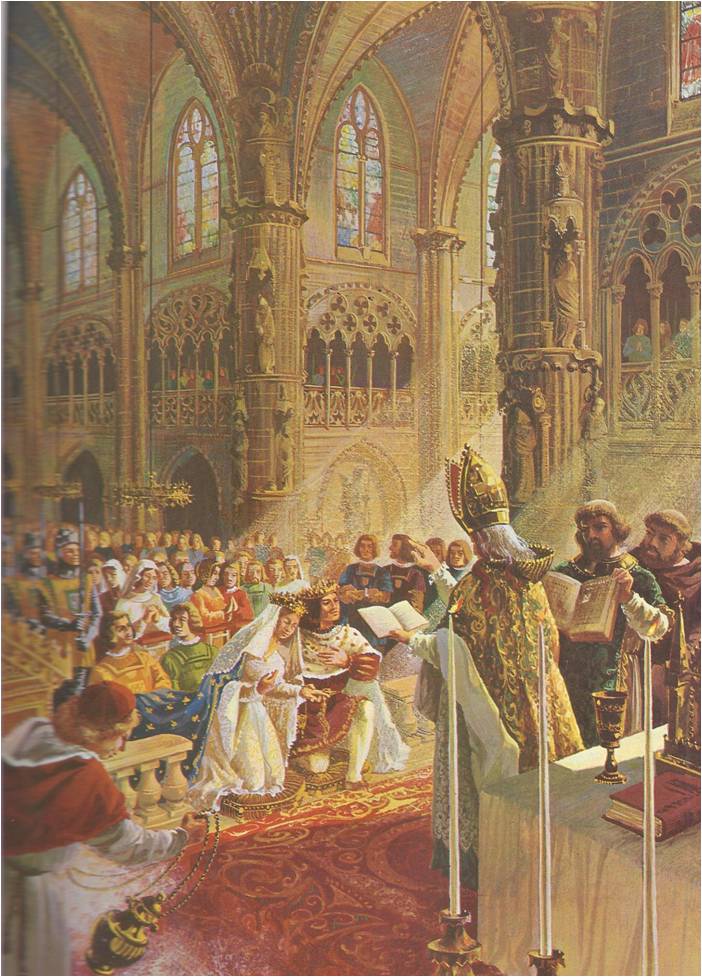IT WAS Wednesday, October 18, 1469 and Princess Isabella of Castile and Prince Ferdinand of Aragon were being married. At the end of the beautiful ceremony, the two thousand guests cheered and the entire city of Valladolid began a week of celebration. Isabella was overjoyed, for she loved her husband and he loved her. They seemed well matched. Isabella was eighteen, tall, blonde and blue-eyed – “The handsomest lady I ever beheld‚” one nobleman said. Ferdinand was slightly shorter than his wife, but he was handsome. Isabella was intelligent, very religious and strong-willed. Ferdinand, too, was intelligent and he was extremely shrewd. The happy couple talked for long hours, went riding, played chess and their love grew. Isabella was glad to escape from the royal court of her brother, King Henry IV of Castile. Castile was the largest of the several kingdoms that made up Spain and under Henry IV it was probably the worst ruled. Isabella hated Henry’s court. The nobles were proud, ignorant and insolent; some were fierce warriors, the rest seemed lazy. Most of them taxed their peasants harshly, then spent the money on magnificent lace-trimmed clothes, on drinking and fighting. King Henry himself set a bad example. He was cruel, he loved to watch spectacles and fires, he let his guard of wild Moorish soldiers insult the young Spanish ladies. When their fathers complained, he told them they were insane and had them whipped in public. The nobles could get anything they wanted from Henry. Sometimes he gave them blank checks to take any sum they wished from Castile’s treasury. Henry was a weak king and became known as Henry the impotent. In the provinces, the nobles were even more unruly. Around Seville, the Duke of Medina-Sidonia and the hot-headed Marquis of Cadiz were at war, …
Read More »A New World and a New Sea 1492-1522
ALONG THE DUSTY SPANISH road leading north from Granada plodded a mule. On its back, bouncing and cursing his luck, sat a glum Italian sea captain. Four years before, Captain Cristobal Colon — the English would call him Christopher Columbus — had come to Spain on horseback, like a gentleman. He had been received at court, granted audiences with King Ferdinand and Queen Isabella and invited to describe his daring plan to sail west across the Ocean Sea to India. Royal advisers had asked to study his maps and the charts on which he had plotted a course and he had waited, full of hope. The king was busy chasing Moslems out of Granada and the pious queen was more interested in church matters than exploration. Although everyone was polite and encouraging, no one offered the gold Columbus needed for his expedition. At last, gathering up his maps, he set out for the court of France. This time, like a peasant, he rode on the back of a mule, the only mount he could afford. Some miles out of Granada, Columbus heard behind him the sound of galloping hoofs. Then a horseman in royal livery reined in beside him and called for him to stop. He must turn back, the horseman said. The queen wished to hear again his plan to sail to the Indies. One royal adviser had not forgotten Columbus’ maps. When he heard that the captain was leaving Spain, he had rushed to Queen Isabella and urged her to hire Columbus to sail under the Spanish flag. Portugal, he reminded her, was profiting richly from such expeditions. He added, if Columbus found a route to the East, there would be a splendid opportunity to convert the heathen Indians and Chinese to Christianity. The queen agreed and asked …
Read More »Prince Henry’s School 1415 – 1499
IN 1415, WHEN ALL OF CHRISTENDOM belonged to one church and Christians battled pagan Turks instead of one another, a force of Portuguese marines set sail for the coast of Africa. They planned to attack a town called Ceuta. A stronghold that guarded the narrow passage connecting the Mediterranean Sea with the Atlantic, Ceuta was the end link in the chain of fortresses and well-armed ports that the Turks had tightened around the southern and eastern boundaries of Europe. Held in by this chain, European merchants could not trade in the luxury-filled markets of the east, pilgrims could not journey to Jerusalem and missionaries could not carry the word of God to the countless “lost souls” of Africa and the Indies. While the Turks held Ceuta, it was dangerous for the merchants of northern and southern Europe merely to trade with one another. So the king of Portugal sent out an expedition of his toughest marines. At their head he placed his own son, Prince Henry, who was young but skilled in the tactics of war. With a favourable wind driving his ships at top speed, Prince Henry caught the Turks by surprise. He sank their fleet, destroyed their docks‚ burned their town and triumphantly sailed home to announce that the sea routes were free once more. The king rewarded his son by naming him master of the Naval Arsenal at Sagres, the port of Lagos and all of the Cape of St. Vincent, the rocky headland that jutted like a pointing finger from southern Portugal into the Atlantic. Prince Henry was delighted. Ships and the sea were his love and his life and he had many ideas for the fleet that now was his to command. These ideas were the beginning of a great age of exploration. They would …
Read More »


